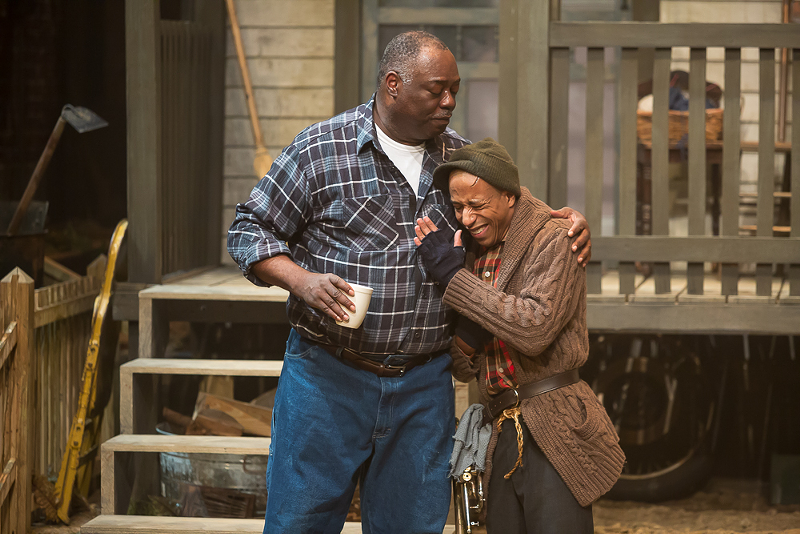CRITIC'S PICK
Let’s give thanks that the Cincinnati Shakespeare Company broadly defines its role as a classic stage. The company goes beyond the Bard to present other historical works of theatrical importance. For the first time, they have landed on August Wilson, an American playwright whose works surely elicit comparison in craft, language and characters to Shakespeare’s. Wilson’s 1985 Pulitzer Prize-winning Fences is presently onstage at the company’s Over-the-Rhine venue — and it’s not to be missed.
Set in the 1950s, Fences is in the sixth slot of Wilson’s “American Century Cycle." It portrays African-American life across the 10 decades of the 20th century and tells the story of Troy Maxson, a proud but flawed potential baseball star who had the misfortune of “aging out” before black players began to enter Major League Baseball. With limited career options, he is relegated to employment as a garbageman. Though he works hard to support his family, his bitterness and circumstances poison his relationships with his son, Cory, and wife, Rose.
To portray Troy, Cincy Shakes recruited a guest actor, the singularly named “ranney,” an award-winning veteran of Wilson productions elsewhere. He’s a fine choice, creating a brutal portrait of a man who rages against his plight in life, his imminent death, the devil and injustices that have affected him and his brother Gabe (Geoffrey Warren Barnes), who was injured in World War II and left with a mental disability.
Sadly, Troy’s disappointments push him in misguided directions that accelerate his life’s downward spiral: He cheats on Rose — played by Torie Wiggins with profound empathy and dignity — a compassionate and loving wife who struggles and makes sacrifices as Troy selfishly battles his own demons. He callously disregards Lyons (Darnell Pierre Benjamin), his adult son from a previous marriage. And he dominates and criticizes Cory (Crystian Wiltshire), his and Rose’s teenage son, for his athletic aspirations — and for just about every decision Cory undertakes. Ultimately, Troy alienates the people he needs the most.
Troy’s best side comes forward as his brother’s protector, but even that is tempered by guilt over using Gabe’s disability award to purchase his house (and charging him rent to live there). Though he takes responsibility for his illegitimate child, he expects Rose to provide care. The plot boils to a point where even his longtime friend Jim Bono (played with humor and texture by Sylvester Little Jr.) begins to question Troy’s decisions.
Wilson elevates this overtly domestic tale with spectacular invention. Gabe is the play’s oracular character, someone whose distracted insights transcend everyday reality — a role found in many of Wilson’s scripts. Gabe wears a battered trumpet tied around his waist, which plays a miraculous part in the finale. References to the Angel Gabriel and Heaven’s Gate push this tragedy to another level.
As a note in the program cites, Wilson wrote that through looking at Troy’s more or less invisible life, people can find that it’s shot through with “love, honor, beauty, betrayal, duty” — making him both relatable and tragic. Troy repeatedly expands events of his life into mythic tales of struggles with the devil, which underpin his real-life battles. “ranney” delivers several powerful soliloquies that are as Shakespearean — just in a different dialect — than any in Cincy Shakes’ regular stock in trade.
Veteran guest director Christopher V. Edwards masterfully stages the production. Wilson’s plays are wordy and can feel drawn out, but Edwards and his fine cast give Fences a forward momentum that travels with fatalistic speed: You sense the tragic outcome long before it arrives.
Also contributing significantly to Fences’ impact is Shannon Moore’s detailed scenic design: a plain, but neatly maintained, two-story house in Pittsburgh’s Hill District (where most of Wilson’s plays are set), with a short porch and a hard-packed, dusty dirt yard. An incomplete picket fence surrounds the yard for most of the play, only to be finished as Troy’s life closes in. It’s a reminder of the fences over which he once hit home runs and the barriers he could never surmount, which acts as a perfect metaphor for this tough play.
Fences, presented by Cincinnati Shakespeare Company, continues through Feb. 16. More info/tickets: cincyshakes.com.


